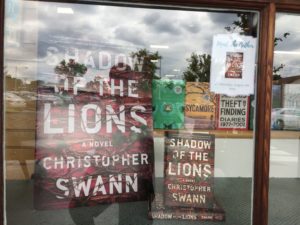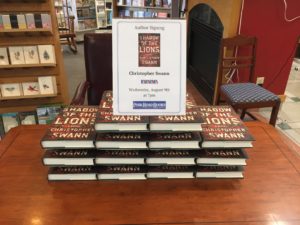 Park Road Books, located in a nice shopping center in Charlotte, looks relatively nondescript on the outside. Take a closer look through the large bay window–ignore the book on prominent display–and you’ll see something else. The front of the store has a small sitting area, almost like a casual living room with a fireplace. Behind that is the sales counter, and beyond that are the long, narrow alleys of bookshelves.
Park Road Books, located in a nice shopping center in Charlotte, looks relatively nondescript on the outside. Take a closer look through the large bay window–ignore the book on prominent display–and you’ll see something else. The front of the store has a small sitting area, almost like a casual living room with a fireplace. Behind that is the sales counter, and beyond that are the long, narrow alleys of bookshelves.
I met Sally, the manager, whose husband Frazer is in sales for Algonquin. She and her staff, particularly Chris and Shauna, were very friendly and helpful. While I was wandering the aisles, I heard at least two separate customers ask for book recommendations along the lines of, “I just read Gone Girl and liked it, and I’m looking for something similar, but not as dark, and maybe with more likable characters?” Each time, Park Road’s staff led the customer into the shelves, suggesting multiple books. This is the sort of thing indie bookstores do well. It’s not about the comfy chairs, or the whimsical decor, or the bran muffins they serve, or the hand-written notes from the staff about their favorite books. (Well, it might be about that last one, a little bit.) It’s about the personal connection with a customer, the deep knowledge of books and of readers, the memory not only for books but for those very customers when they return again and again, as many inevitably do. When I go into my neighborhood Barnes and Noble, the staff there are always very polite, but they might be selling books or belts or baklava. To those stores, a book tends to be a product. To a good indie bookstore, a book is, to quote Stephen King, a uniquely portable magic.
 I was sort of wandering around in the store half an hour before my event was supposed to start when a vaguely familiar man and his teenage son approached. “Chris Swann?” the man said. “I don’t know if you remember me. William Harris.” Mr. Harris was my ninth-grade Ancient History teacher at Woodberry. I had loved his class. He introduced me to his son, who had just graduated from Woodberry. They now lived in Charlotte, and had a prior dinner engagement, but he had wanted to stop by, get a copy of my book, and get my signature.
I was sort of wandering around in the store half an hour before my event was supposed to start when a vaguely familiar man and his teenage son approached. “Chris Swann?” the man said. “I don’t know if you remember me. William Harris.” Mr. Harris was my ninth-grade Ancient History teacher at Woodberry. I had loved his class. He introduced me to his son, who had just graduated from Woodberry. They now lived in Charlotte, and had a prior dinner engagement, but he had wanted to stop by, get a copy of my book, and get my signature.
Mr. Harris and his son left, and then Trent and Mindy Merchant came in. Trent and I were classmates at Washington and Lee. Soon after graduation, I was coaching a soccer team at Holy Innocents’ and drove them up to a school in Rabun Gap for a game. The Rabun Gap coach turned out to be Trent. A few years later, we hired Trent to teach English, religion, and drama at Holy Innocents’. He also acted on stage, including at the Shakespeare Tavern in Atlanta. (One of my favorite Trent Merchant stories: he was acting onstage when an audience member began talking, loudly, which was distracting to both the other audience members and the actors. After a few moments, Trent called “Hold” to his fellow actors, essentially stopping the scene, then, addressing the audience member directly, told her to be quiet “or get the f— out.” That moment got written up in an article in the Atlanta Journal-Constitution.)
A confession: while I was truly glad to see Trent and Mindy, I was also a tad nervous. When I had read aloud from my novel before, I had read the first two or three pages as an introduction to the story. That night, I had decided to read the second half of the prologue, when Matthias and Fritz get into their argument, and Fritz takes off on his fateful run into the woods. It’s a more dramatic scene. It also contains dialogue, and so I wanted to read the two voices differently. I’m not a trained actor. Trent, on the other hand, is. I only hoped my reading would be satisfactory.
It was a small gathering that evening. Trent and Mindy sat in a row of chairs set out by the booksellers. Near them, an African-American lady sat by herself. A father and his teenage daughter sat on a couch to the side. Three women sat in comfy armchairs at the back. One of them, a regular customer, had driven all the way from Gastonia for tonight’s reading.
There was a table at the front of the reading space where presumably I would sign books afterwards. A large armchair sat behind the table. When it was time for me to start, I pulled the chair out from behind the table and sat closer to the audience. “Feels less like a board meeting,” I said. They chuckled appreciatively. Trent sat back in his chair, comfortable, expectant.
Different bookstores, I’ve found, have different perspectives on authors reading from their works. Some love it. Others actively dissuade authors from doing it, fearing it will be boring. I’ve attended fantastic author readings. I’ve also attended some that were less exciting than watching students take the SAT.
Because I’ve taught for a while now, at certain points in certain units I’m pretty confident about what I’m about to do or say in class. It’s not cockiness or arrogance, just a simple sense that I know what I’m about to do, and I know I am capable of doing it well. I can feel that confidence settle on me, like a mantle. And that’s how I felt when I started reading that passage.
It’s not foolproof, that feeling. I’ve been wrong before, realizing that I’m losing my audience. I glanced up from my book occasionally to see how the audience was reacting. The father and daughter were watching me carefully. The lady from Gastonia had closed her eyes, but it seemed she was doing it to better focus on hearing me read aloud; she was nodding her head and smiling occasionally. Trent was now leaning forward in his chair, as if to hear me better. Once or twice he, too, closed his eyes.
When I got to the end, where Matthias admits his twinned sense of guilt and jealousy, his anger that Fritz had left him behind, I concluded, somewhat lamely, “And that’s the prologue.” The audience paused for a moment, then clapped. It was quiet applause, but it was earnest. Trent was grinning.
Read that part from now on, I thought.
Next stop – Malaprop’s in Asheville!





